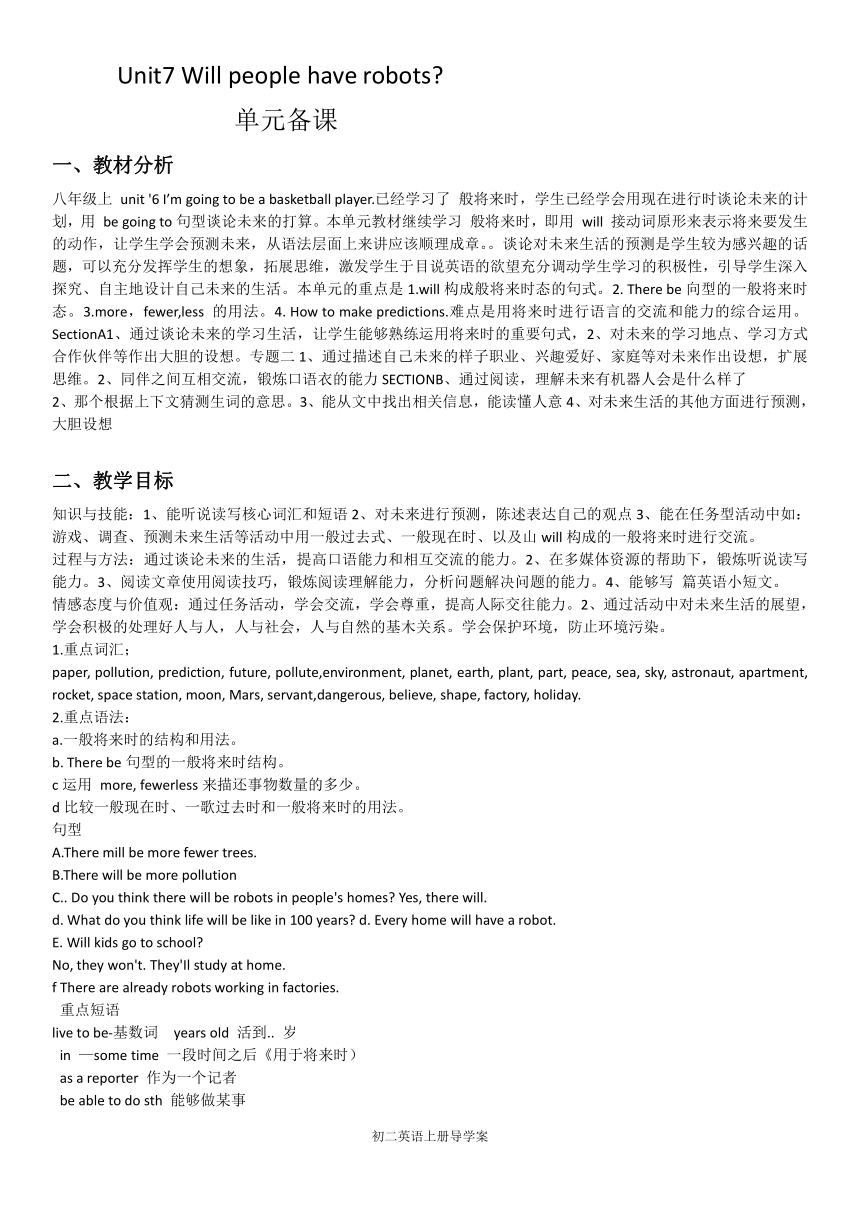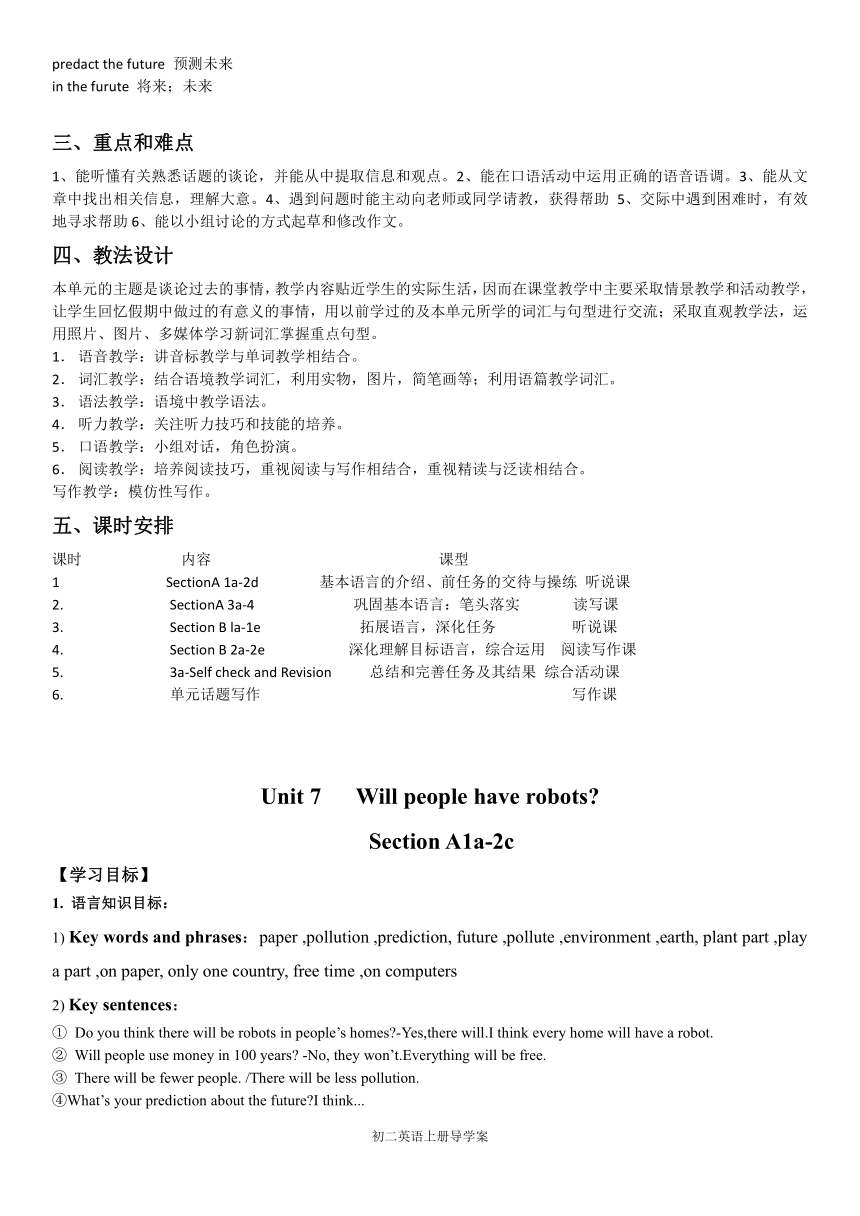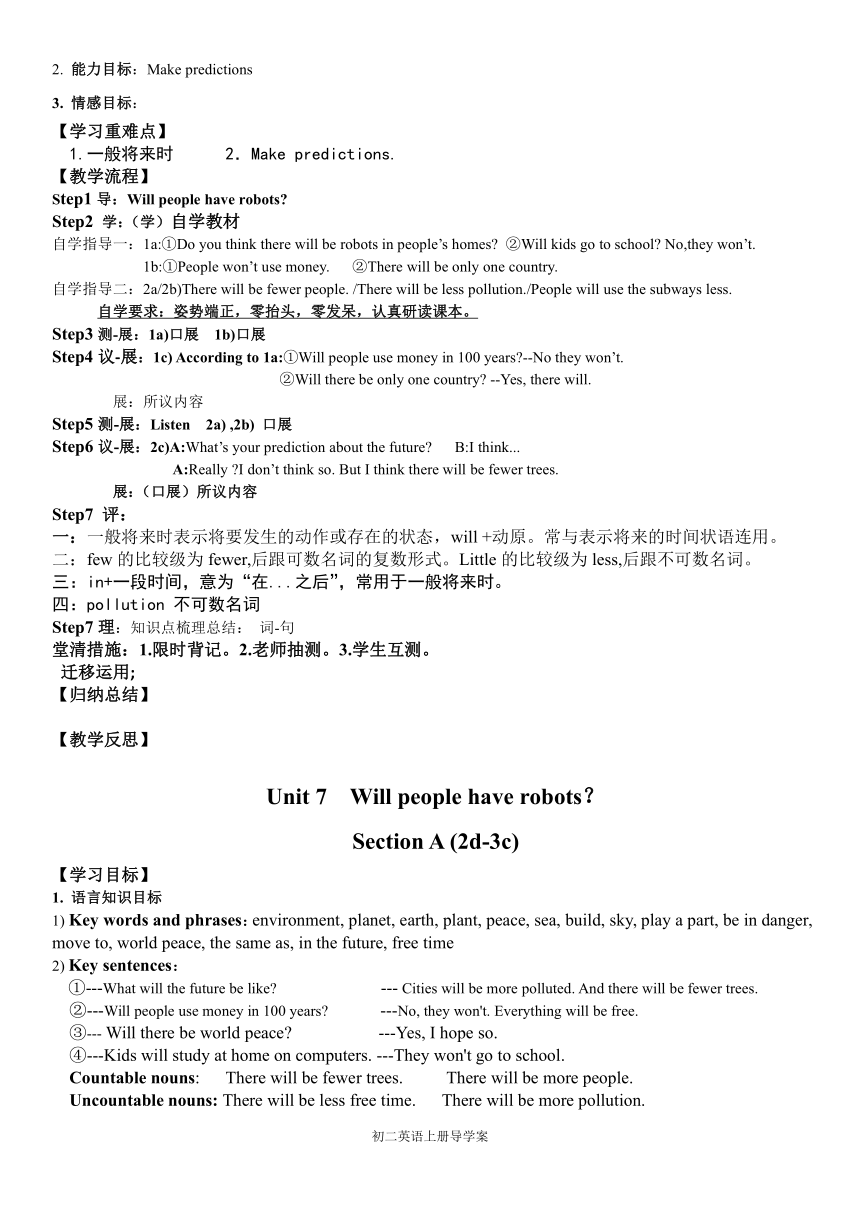Unit 7 Will people have robots? 单元导学案(5课时)
文档属性
| 名称 | Unit 7 Will people have robots? 单元导学案(5课时) |  | |
| 格式 | docx | ||
| 文件大小 | 29.9KB | ||
| 资源类型 | 教案 | ||
| 版本资源 | 人教新目标(Go for it)版 | ||
| 科目 | 英语 | ||
| 更新时间 | 2023-10-18 22:46:32 | ||
图片预览



文档简介
Unit7 Will people have robots
单元备课
一、教材分析
八年级上 unit '6 I’m going to be a basketball player.已经学习了 般将来时,学生已经学会用现在进行时谈论未来的计划,用 be going to句型谈论未来的打算。本单元教材继续学习 般将来时,即用 will 接动词原形来表示将来要发生的动作,让学生学会预测未来,从语法层面上来讲应该顺理成章。。谈论对未来生活的预测是学生较为感兴趣的话题,可以充分发挥学生的想象,拓展思维,激发学生于目说英语的欲望充分调动学生学习的积极性,引导学生深入探究、自主地设计自己未来的生活。本单元的重点是1.will构成般将来时态的句式。2. There be向型的一般将来时态。3.more,fewer,less 的用法。4. How to make predictions.难点是用将来时进行语言的交流和能力的综合运用。SectionA1、通过谈论未来的学习生活,让学生能够熟练运用将来时的重要句式,2、对未来的学习地点、学习方式合作伙伴等作出大胆的设想。专题二1、通过描述自己未来的样子职业、兴趣爱好、家庭等对未来作出设想,扩展思维。2、同伴之间互相交流,锻炼口语衣的能力SECTIONB、通过阅读,理解未来有机器人会是什么样了
2、那个根据上下文猜测生词的意思。3、能从文中找出相关信息,能读懂人意4、对未来生活的其他方面进行预测,大胆设想
二、教学目标
知识与技能:1、能听说读写核心词汇和短语2、对未来进行预测,陈述表达自己的观点3、能在任务型活动中如:游戏、调查、预测未来生活等活动中用一般过去式、一般现在时、以及山will构成的一般将来时进行交流。
过程与方法:通过谈论未来的生活,提高口语能力和相互交流的能力。2、在多媒体资源的帮助下,锻炼听说读写能力。3、阅读文章使用阅读技巧,锻炼阅读理解能力,分析问题解决问题的能力。4、能够写 篇英语小短文。
情感态度与价值观:通过任务活动,学会交流,学会尊重,提高人际交往能力。2、通过活动中对未来生活的展望,学会积极的处理好人与人,人与社会,人与自然的基木关系。学会保护环境,防止环境污染。
1.重点词汇;
paper, pollution, prediction, future, pollute,environment, planet, earth, plant, part, peace, sea, sky, astronaut, apartment, rocket, space station, moon, Mars, servant,dangerous, believe, shape, factory, holiday.
2.重点语法:
a.一般将来时的结构和用法。
b. There be句型的一般将来时结构。
c运用 more, fewerless来描还事物数量的多少。
d比较一般现在时、一歌过去时和一般将来时的用法。
句型
A.There mill be more fewer trees.
B.There will be more pollution
C.. Do you think there will be robots in people's homes Yes, there will.
d. What do you think life will be like in 100 years d. Every home will have a robot.
E. Will kids go to school
No, they won't. They'Il study at home.
f There are already robots working in factories.
重点短语
live to be-基数词 years old 活到.. 岁
in —some time 一段时间之后《用于将来时)
as a reporter 作为一个记者
be able to do sth 能够做某事
predact the future 预测未来
in the furute 将来;未来
三、重点和难点
1、能听懂有关熟悉话题的谈论,并能从中提取信息和观点。2、能在口语活动中运用正确的语音语调。3、能从文章中找出相关信息,理解大意。4、遇到问题时能主动向老师或同学请教,获得帮助 5、交际中遇到困难时,有效地寻求帮助6、能以小组讨论的方式起草和修改作文。
四、教法设计
本单元的主题是谈论过去的事情,教学内容贴近学生的实际生活,因而在课堂教学中主要采取情景教学和活动教学,让学生回忆假期中做过的有意义的事情,用以前学过的及本单元所学的词汇与句型进行交流;采取直观教学法,运用照片、图片、多媒体学习新词汇掌握重点句型。
语音教学:讲音标教学与单词教学相结合。
词汇教学:结合语境教学词汇,利用实物,图片,简笔画等;利用语篇教学词汇。
语法教学:语境中教学语法。
听力教学:关注听力技巧和技能的培养。
口语教学:小组对话,角色扮演。
阅读教学:培养阅读技巧,重视阅读与写作相结合,重视精读与泛读相结合。
写作教学:模仿性写作。
五、课时安排
课时 内容 课型
1 SectionA 1a-2d 基本语言的介绍、前任务的交待与操练 听说课
2. SectionA 3a-4 巩固基本语言:笔头落实 读写课
3. Section B la-1e 拓展语言,深化任务 听说课
4. Section B 2a-2e 深化理解目标语言,综合运用 阅读写作课
5. 3a-Self check and Revision 总结和完善任务及其结果 综合活动课
6. 单元话题写作 写作课
Unit 7 Will people have robots
Section A1a-2c
【学习目标】
1. 语言知识目标:
1) Key words and phrases:paper ,pollution ,prediction, future ,pollute ,environment ,earth, plant part ,play a part ,on paper, only one country, free time ,on computers
2) Key sentences:
① Do you think there will be robots in people’s homes -Yes,there will.I think every home will have a robot.
② Will people use money in 100 years -No, they won’t.Everything will be free.
③ There will be fewer people. /There will be less pollution.
④What’s your prediction about the future I think...
能力目标:Make predictions
3. 情感目标:
【学习重难点】
1.一般将来时 2.Make predictions.
【教学流程】
Step1导:Will people have robots
Step2 学:(学)自学教材
自学指导一:1a:①Do you think there will be robots in people’s homes ②Will kids go to school No,they won’t.
1b:①People won’t use money. ②There will be only one country.
自学指导二:2a/2b)There will be fewer people. /There will be less pollution./People will use the subways less.
自学要求:姿势端正,零抬头,零发呆,认真研读课本。
Step3测-展:1a)口展 1b)口展
Step4议-展:1c) According to 1a:①Will people use money in 100 years --No they won’t.
②Will there be only one country --Yes, there will.
展:所议内容
Step5测-展:Listen 2a) ,2b) 口展
Step6议-展:2c)A:What’s your prediction about the future B:I think...
A:Really I don’t think so. But I think there will be fewer trees.
展:(口展)所议内容
Step7 评:
一:一般将来时表示将要发生的动作或存在的状态,will +动原。常与表示将来的时间状语连用。
二:few的比较级为fewer,后跟可数名词的复数形式。Little的比较级为less,后跟不可数名词。
三:in+一段时间,意为“在...之后”,常用于一般将来时。
四:pollution 不可数名词
Step7理:知识点梳理总结: 词-句
堂清措施:1.限时背记。2.老师抽测。3.学生互测。
迁移运用;
【归纳总结】
【教学反思】
Unit 7 Will people have robots?
Section A (2d-3c)
【学习目标】
1. 语言知识目标
1) Key words and phrases:environment, planet, earth, plant, peace, sea, build, sky, play a part, be in danger, move to, world peace, the same as, in the future, free time
2) Key sentences:
①---What will the future be like --- Cities will be more polluted. And there will be fewer trees.
②---Will people use money in 100 years ---No, they won't. Everything will be free.
③--- Will there be world peace ---Yes, I hope so.
④---Kids will study at home on computers. ---They won't go to school.
Countable nouns: There will be fewer trees. There will be more people.
Uncountable nouns: There will be less free time. There will be more pollution.
2. 能力目标:there be结构的一般将来时;more, fewer, less的用法。
3. 情感目标:运用一般将来时对未来进行预测。
【学习重难点】
重点:there be结构在一般将来时中的用法。难点:more, fewer, less的用法及区分可数和不可数名词
【教学流程】
Step1导:以环境污染为话题并结合2d图片引入新单词
Step2学:(学)自学教材2d
自学要求:姿势端正,零抬头,零发呆,认真研读课本。
Step3测:学生自学2d并回答问题:
1) What will the future be like 2) Then what can we do
Step4议:
对议:2人一组练习对话 组议: 以小组为单位翻译
Step5展:
口展:2人一组分角色展示对话;找一位学生翻译。师点评后限时记忆2d
Step6学:(测—议)自学Grammar Focus,练习对话并翻译
Step7展:口展自学结果。师评后限时记忆Grammar Focus,区分可数和不可数名词
Step8测:完成3a, 3b练习题
Step9展:找学生口展答案后,通过PPT核对答案
Step10评:
知识点一:What will…be like ……将会怎么样? 拓展:what's sb. like? 某人(性格)怎么样?
知识点二: in (great) danger 处于 (极度)危险中,out of danger 脱离危险 dangerous adj. 危险的
Step11理:知识点梳理总结: 词-句
堂清措施:1.限时背记。2.老师抽测。3.学生互测。
迁移运用:
【教学反思】
Unit 7 Will people have robots
SectionB 1a-1e
学习目标:
语言知识目标:1.Key words :astronaut,apartment,rocket,space,space station.
2.Key sentences:1.Where do you live
I live in an apartment across the street from here.
3.能力目标:学生能用所学语言讨论未来生活。
教学重难点:学生能表达未来的预测和未来生活。
教学流程:Step1导:图片导入,教师问学生“What do you think your life will be like in 50 years ”而后出示未来生活的相关图片引出本课。
Step2学:自学教材,要求学生:姿势端正,零抬头,零发呆,认真研读课本。出示新单词,让学生根据音标读出来,让学生快速大声朗读1a中出现的词汇并翻译出来。
Step3测:1.让学生完成1a、1b学习任务。3.让学生听听力完成1c听力任务,让学生跟读1d听力,完成1d听力任务。
Step4议:把班级同学分成四人一组,让他们用所学语言描述过去、现在、以后的生活情况,完成1e学习任务。
Step5.展:1.找学生口展1a、1b、1c以及1e。2.找学生板展1d听力答案。
Step6.评:知识点一:一般将来时构成:will+动词原形。表示将来时没有事先考虑,be going to是事先考虑好的。肯定句:主语+will+动词原形+其他。否定句:主语+will not/won't+动词原形+其他。一般疑问句:Will+主语+动词原形+其他?特殊疑问句:特殊疑问词+will+主语+其他?
知识点二:space意为“太空、空间”,是不可数名词,常用搭配in space意为“在太空中”。
Step7理:知识点梳理总结:重点词汇、句型以及will的用法。
堂清措施:①限时记忆②教师提问③学生互测。
迁移运用:句型转换:1.Mike will be late for school tomorrow.(改为否定句)
____________________________________________
2.He will go to Shanghai next Sunday.(改为一般疑问句)
___________________________________________
3.I will go to the park tomorrow(对park进行提问)
___________________________________________
归纳总结:找学生总结本节所学主要内容,教师适当做补充。
教学反思:________________________________________________________________________________________________________________________________________________________________________________________________
Unit 7 Will people have robots
Section 3a-selfcheck
【学习目标】
1. 语言知识目标:
1) Key words and phrases:.probably,during holiday word
Key sentences: 1. In 20 years, I think I’ll be... 2. I think I’ll/won’t.
【学习重难点】 1。1. In 20 years, I think I’ll be... 2. I think I’ll/won’t...
2.Write a composition about your life 20 years from now.
Step1导:What will your life be like in the future Well, Jill has her answers. Now look at 3a.
Step2 学:Presentation
. Work on 3a.
Read the words in the box.
Scan the passage and then fill in the blanks.
Check the answer.
Read the passage together.
Step3 测:Mind Map-- life in the future
life in the future
job
places to live
friends and pets
dressing
free time activities
Write down the information. 要求:姿势端正,零抬头,零发呆,认真研读课本
Step4议 Work on 3c.
Ask Ss to write a composition about their life 20 years from now according to 3a and 3b.
Ss check and correct each others compositions and then revise them.
Have some students show their compositions to the class.
Step5 展 1.Target language: 1. In 20 years, I think I’ll be... 2. I think I’ll/won’t...
Step6 评1.Read and recite the new words in this unit.
Step7理:知识点梳理总结:Summary: review the words and sentences
And writing
Homework: self check 1和2课堂练习做完。
堂清措施:1.限时背记。2.老师抽测。3.学生互测。
迁移运用;
【归纳总结】1.学生总结 2.老师做重要补充
【教学反思】
初二英语上册导学案
单元备课
一、教材分析
八年级上 unit '6 I’m going to be a basketball player.已经学习了 般将来时,学生已经学会用现在进行时谈论未来的计划,用 be going to句型谈论未来的打算。本单元教材继续学习 般将来时,即用 will 接动词原形来表示将来要发生的动作,让学生学会预测未来,从语法层面上来讲应该顺理成章。。谈论对未来生活的预测是学生较为感兴趣的话题,可以充分发挥学生的想象,拓展思维,激发学生于目说英语的欲望充分调动学生学习的积极性,引导学生深入探究、自主地设计自己未来的生活。本单元的重点是1.will构成般将来时态的句式。2. There be向型的一般将来时态。3.more,fewer,less 的用法。4. How to make predictions.难点是用将来时进行语言的交流和能力的综合运用。SectionA1、通过谈论未来的学习生活,让学生能够熟练运用将来时的重要句式,2、对未来的学习地点、学习方式合作伙伴等作出大胆的设想。专题二1、通过描述自己未来的样子职业、兴趣爱好、家庭等对未来作出设想,扩展思维。2、同伴之间互相交流,锻炼口语衣的能力SECTIONB、通过阅读,理解未来有机器人会是什么样了
2、那个根据上下文猜测生词的意思。3、能从文中找出相关信息,能读懂人意4、对未来生活的其他方面进行预测,大胆设想
二、教学目标
知识与技能:1、能听说读写核心词汇和短语2、对未来进行预测,陈述表达自己的观点3、能在任务型活动中如:游戏、调查、预测未来生活等活动中用一般过去式、一般现在时、以及山will构成的一般将来时进行交流。
过程与方法:通过谈论未来的生活,提高口语能力和相互交流的能力。2、在多媒体资源的帮助下,锻炼听说读写能力。3、阅读文章使用阅读技巧,锻炼阅读理解能力,分析问题解决问题的能力。4、能够写 篇英语小短文。
情感态度与价值观:通过任务活动,学会交流,学会尊重,提高人际交往能力。2、通过活动中对未来生活的展望,学会积极的处理好人与人,人与社会,人与自然的基木关系。学会保护环境,防止环境污染。
1.重点词汇;
paper, pollution, prediction, future, pollute,environment, planet, earth, plant, part, peace, sea, sky, astronaut, apartment, rocket, space station, moon, Mars, servant,dangerous, believe, shape, factory, holiday.
2.重点语法:
a.一般将来时的结构和用法。
b. There be句型的一般将来时结构。
c运用 more, fewerless来描还事物数量的多少。
d比较一般现在时、一歌过去时和一般将来时的用法。
句型
A.There mill be more fewer trees.
B.There will be more pollution
C.. Do you think there will be robots in people's homes Yes, there will.
d. What do you think life will be like in 100 years d. Every home will have a robot.
E. Will kids go to school
No, they won't. They'Il study at home.
f There are already robots working in factories.
重点短语
live to be-基数词 years old 活到.. 岁
in —some time 一段时间之后《用于将来时)
as a reporter 作为一个记者
be able to do sth 能够做某事
predact the future 预测未来
in the furute 将来;未来
三、重点和难点
1、能听懂有关熟悉话题的谈论,并能从中提取信息和观点。2、能在口语活动中运用正确的语音语调。3、能从文章中找出相关信息,理解大意。4、遇到问题时能主动向老师或同学请教,获得帮助 5、交际中遇到困难时,有效地寻求帮助6、能以小组讨论的方式起草和修改作文。
四、教法设计
本单元的主题是谈论过去的事情,教学内容贴近学生的实际生活,因而在课堂教学中主要采取情景教学和活动教学,让学生回忆假期中做过的有意义的事情,用以前学过的及本单元所学的词汇与句型进行交流;采取直观教学法,运用照片、图片、多媒体学习新词汇掌握重点句型。
语音教学:讲音标教学与单词教学相结合。
词汇教学:结合语境教学词汇,利用实物,图片,简笔画等;利用语篇教学词汇。
语法教学:语境中教学语法。
听力教学:关注听力技巧和技能的培养。
口语教学:小组对话,角色扮演。
阅读教学:培养阅读技巧,重视阅读与写作相结合,重视精读与泛读相结合。
写作教学:模仿性写作。
五、课时安排
课时 内容 课型
1 SectionA 1a-2d 基本语言的介绍、前任务的交待与操练 听说课
2. SectionA 3a-4 巩固基本语言:笔头落实 读写课
3. Section B la-1e 拓展语言,深化任务 听说课
4. Section B 2a-2e 深化理解目标语言,综合运用 阅读写作课
5. 3a-Self check and Revision 总结和完善任务及其结果 综合活动课
6. 单元话题写作 写作课
Unit 7 Will people have robots
Section A1a-2c
【学习目标】
1. 语言知识目标:
1) Key words and phrases:paper ,pollution ,prediction, future ,pollute ,environment ,earth, plant part ,play a part ,on paper, only one country, free time ,on computers
2) Key sentences:
① Do you think there will be robots in people’s homes -Yes,there will.I think every home will have a robot.
② Will people use money in 100 years -No, they won’t.Everything will be free.
③ There will be fewer people. /There will be less pollution.
④What’s your prediction about the future I think...
能力目标:Make predictions
3. 情感目标:
【学习重难点】
1.一般将来时 2.Make predictions.
【教学流程】
Step1导:Will people have robots
Step2 学:(学)自学教材
自学指导一:1a:①Do you think there will be robots in people’s homes ②Will kids go to school No,they won’t.
1b:①People won’t use money. ②There will be only one country.
自学指导二:2a/2b)There will be fewer people. /There will be less pollution./People will use the subways less.
自学要求:姿势端正,零抬头,零发呆,认真研读课本。
Step3测-展:1a)口展 1b)口展
Step4议-展:1c) According to 1a:①Will people use money in 100 years --No they won’t.
②Will there be only one country --Yes, there will.
展:所议内容
Step5测-展:Listen 2a) ,2b) 口展
Step6议-展:2c)A:What’s your prediction about the future B:I think...
A:Really I don’t think so. But I think there will be fewer trees.
展:(口展)所议内容
Step7 评:
一:一般将来时表示将要发生的动作或存在的状态,will +动原。常与表示将来的时间状语连用。
二:few的比较级为fewer,后跟可数名词的复数形式。Little的比较级为less,后跟不可数名词。
三:in+一段时间,意为“在...之后”,常用于一般将来时。
四:pollution 不可数名词
Step7理:知识点梳理总结: 词-句
堂清措施:1.限时背记。2.老师抽测。3.学生互测。
迁移运用;
【归纳总结】
【教学反思】
Unit 7 Will people have robots?
Section A (2d-3c)
【学习目标】
1. 语言知识目标
1) Key words and phrases:environment, planet, earth, plant, peace, sea, build, sky, play a part, be in danger, move to, world peace, the same as, in the future, free time
2) Key sentences:
①---What will the future be like --- Cities will be more polluted. And there will be fewer trees.
②---Will people use money in 100 years ---No, they won't. Everything will be free.
③--- Will there be world peace ---Yes, I hope so.
④---Kids will study at home on computers. ---They won't go to school.
Countable nouns: There will be fewer trees. There will be more people.
Uncountable nouns: There will be less free time. There will be more pollution.
2. 能力目标:there be结构的一般将来时;more, fewer, less的用法。
3. 情感目标:运用一般将来时对未来进行预测。
【学习重难点】
重点:there be结构在一般将来时中的用法。难点:more, fewer, less的用法及区分可数和不可数名词
【教学流程】
Step1导:以环境污染为话题并结合2d图片引入新单词
Step2学:(学)自学教材2d
自学要求:姿势端正,零抬头,零发呆,认真研读课本。
Step3测:学生自学2d并回答问题:
1) What will the future be like 2) Then what can we do
Step4议:
对议:2人一组练习对话 组议: 以小组为单位翻译
Step5展:
口展:2人一组分角色展示对话;找一位学生翻译。师点评后限时记忆2d
Step6学:(测—议)自学Grammar Focus,练习对话并翻译
Step7展:口展自学结果。师评后限时记忆Grammar Focus,区分可数和不可数名词
Step8测:完成3a, 3b练习题
Step9展:找学生口展答案后,通过PPT核对答案
Step10评:
知识点一:What will…be like ……将会怎么样? 拓展:what's sb. like? 某人(性格)怎么样?
知识点二: in (great) danger 处于 (极度)危险中,out of danger 脱离危险 dangerous adj. 危险的
Step11理:知识点梳理总结: 词-句
堂清措施:1.限时背记。2.老师抽测。3.学生互测。
迁移运用:
【教学反思】
Unit 7 Will people have robots
SectionB 1a-1e
学习目标:
语言知识目标:1.Key words :astronaut,apartment,rocket,space,space station.
2.Key sentences:1.Where do you live
I live in an apartment across the street from here.
3.能力目标:学生能用所学语言讨论未来生活。
教学重难点:学生能表达未来的预测和未来生活。
教学流程:Step1导:图片导入,教师问学生“What do you think your life will be like in 50 years ”而后出示未来生活的相关图片引出本课。
Step2学:自学教材,要求学生:姿势端正,零抬头,零发呆,认真研读课本。出示新单词,让学生根据音标读出来,让学生快速大声朗读1a中出现的词汇并翻译出来。
Step3测:1.让学生完成1a、1b学习任务。3.让学生听听力完成1c听力任务,让学生跟读1d听力,完成1d听力任务。
Step4议:把班级同学分成四人一组,让他们用所学语言描述过去、现在、以后的生活情况,完成1e学习任务。
Step5.展:1.找学生口展1a、1b、1c以及1e。2.找学生板展1d听力答案。
Step6.评:知识点一:一般将来时构成:will+动词原形。表示将来时没有事先考虑,be going to是事先考虑好的。肯定句:主语+will+动词原形+其他。否定句:主语+will not/won't+动词原形+其他。一般疑问句:Will+主语+动词原形+其他?特殊疑问句:特殊疑问词+will+主语+其他?
知识点二:space意为“太空、空间”,是不可数名词,常用搭配in space意为“在太空中”。
Step7理:知识点梳理总结:重点词汇、句型以及will的用法。
堂清措施:①限时记忆②教师提问③学生互测。
迁移运用:句型转换:1.Mike will be late for school tomorrow.(改为否定句)
____________________________________________
2.He will go to Shanghai next Sunday.(改为一般疑问句)
___________________________________________
3.I will go to the park tomorrow(对park进行提问)
___________________________________________
归纳总结:找学生总结本节所学主要内容,教师适当做补充。
教学反思:________________________________________________________________________________________________________________________________________________________________________________________________
Unit 7 Will people have robots
Section 3a-selfcheck
【学习目标】
1. 语言知识目标:
1) Key words and phrases:.probably,during holiday word
Key sentences: 1. In 20 years, I think I’ll be... 2. I think I’ll/won’t.
【学习重难点】 1。1. In 20 years, I think I’ll be... 2. I think I’ll/won’t...
2.Write a composition about your life 20 years from now.
Step1导:What will your life be like in the future Well, Jill has her answers. Now look at 3a.
Step2 学:Presentation
. Work on 3a.
Read the words in the box.
Scan the passage and then fill in the blanks.
Check the answer.
Read the passage together.
Step3 测:Mind Map-- life in the future
life in the future
job
places to live
friends and pets
dressing
free time activities
Write down the information. 要求:姿势端正,零抬头,零发呆,认真研读课本
Step4议 Work on 3c.
Ask Ss to write a composition about their life 20 years from now according to 3a and 3b.
Ss check and correct each others compositions and then revise them.
Have some students show their compositions to the class.
Step5 展 1.Target language: 1. In 20 years, I think I’ll be... 2. I think I’ll/won’t...
Step6 评1.Read and recite the new words in this unit.
Step7理:知识点梳理总结:Summary: review the words and sentences
And writing
Homework: self check 1和2课堂练习做完。
堂清措施:1.限时背记。2.老师抽测。3.学生互测。
迁移运用;
【归纳总结】1.学生总结 2.老师做重要补充
【教学反思】
初二英语上册导学案
同课章节目录
- Unit 1 Where did you go on vacation?
- Section A
- Section B
- Unit 2 How often do you exercise?
- Section A
- Section B
- Unit 3 I'm more outgoing than my sister.
- Section A
- Section B
- Unit 4 What's the best movie theater?
- Section A
- Section B
- Unit 5 Do you want to watch a game show?
- Section A
- Section B
- Unit 6 I'm going to study computer science.
- Section A
- Section B
- Unit 7 Will people have robots?
- Section A
- Section B
- Unit 8 How do you make a banana milk shake?
- Section A
- Section B
- Unit 9 Can you come to my party?
- Section A
- Section B
- Unit 10 If you go to the party, you'll have a grea
- Section A
- Section B
